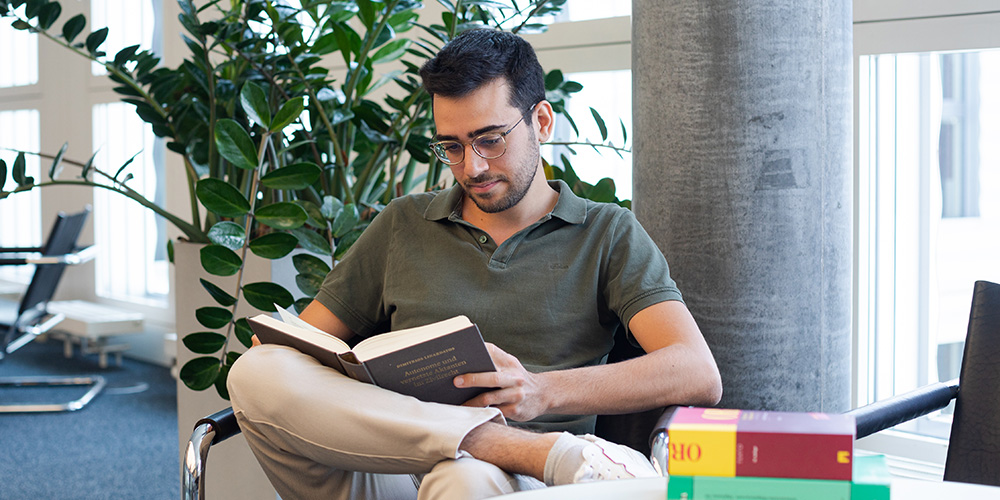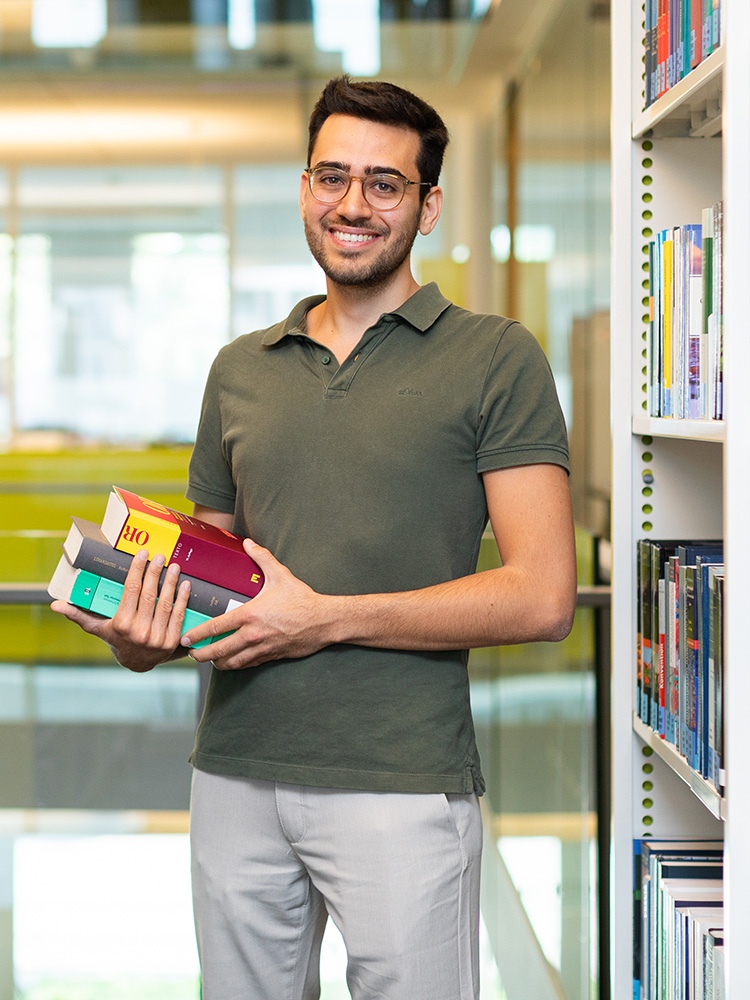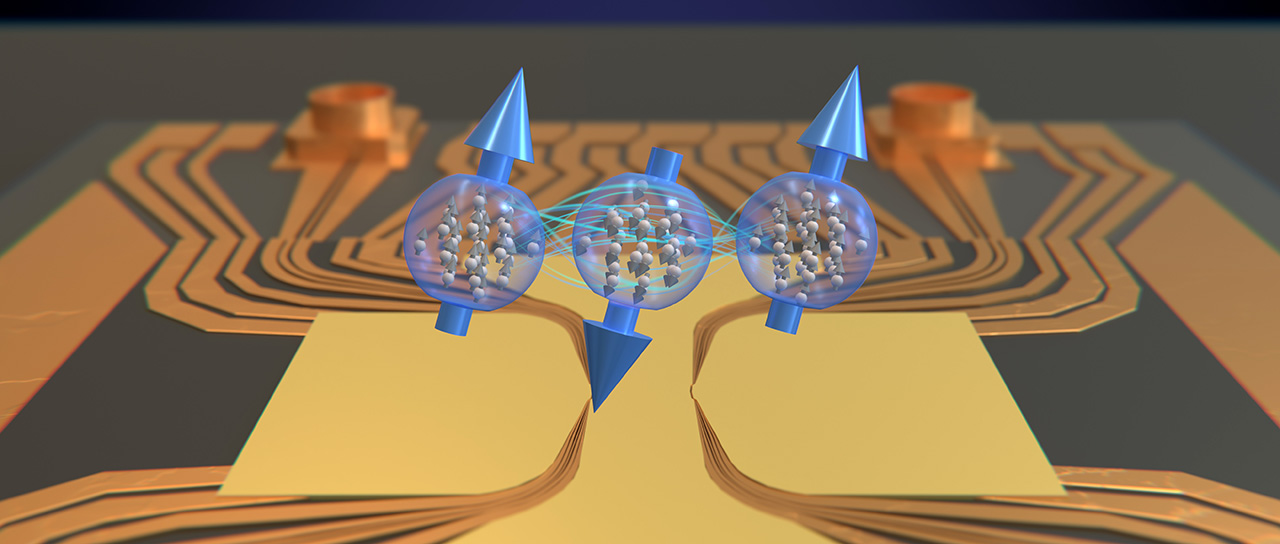In Focus: Christapor Yacoubian asks whether current liability laws are adequate to address the use of nurse robots and chatbots
How does our law react when technology fails? Christapor Yacoubian studies questions of liability when using robots and software agents. The doctoral student in law has already won awards for his academic accomplishments – even though he originally had no intention of studying law.
15 August 2023 | Noëmi Kern
After secondary school, foreign languages were at the top of Christapor Yacoubian’s list of potential university majors. He has a flair for languages: besides his native German and Armenian, he also speaks English, French and Spanish. So he considered studying French and history at the University of Zurich and becoming a teacher. “I was fortunate enough to always have great teachers, so I wanted to become one myself,” says Yacoubian, who grew up in Schaffhausen.
Things turned out differently. Basel instead of Zurich, jurisprudence instead of teaching. Zurich, where many of his friends were studying, was too close for him. Yacoubian wanted to “get out of eastern Switzerland,” so he decided on Basel. He says he feels comfortable here, where there is more happening than in his hometown. And after all, he remained true to the Rhine, he notes with a grin. Though the Rhine here is very different from the Rhine there: “In Schaffhausen, we not only swim in the river; we also float down it on inflatable rafts. There is nothing more relaxing on a hot summer day.”
He calls his decision to study law a coincidence: the information session about Romance languages and literatures was not as promising as he had hoped, so he dropped by the session on law. He had taken economics and law in high school, but he had only a vague idea of what legal studies actually involved. “My decision was ultimately very intuitive and quite spontaneous,” he remarks. But he has not regretted the decision – quite the opposite.
Dry? More like multifaceted and complex.
A glance at Christapor Yacoubian’s achievements thus far is evidence enough that the subject suits him: award for the best bachelor’s thesis, award for the best master’s thesis... Is he ambitious? “Not too much. But I am disciplined and goal oriented. You can’t get along without that in our field.” The first thing he had to learn was how to study. It helps that he has a good memory and easily recognizes connections. His conclusion? “I have found the right path for me.”
He doesn’t find law at all dry. “When a case has to be decided, it’s rarely a black and white matter. What we consider right is influenced, among other things, by our values, and these are ultimately also subjective,” Yacoubian explains. For this reason, it often comes down not to right or wrong, but rather to how defensible a legal judgment is. “It’s an error to believe that a look at the legal code will always provide a clear answer. Students are surprised by this, especially in their first semester,” says the doctoral student, who also leads tutorials as an academic assistant.
What if the nursing robot causes damages?
Questions of judgment also play a role in Christapor Yacoubian’s dissertation. He is focused on the question of who bears responsibility when a digital system fails. A physician’s diagnosis supported by software, delivery of goods via a drone, or investment management by artificial intelligence: as increasingly complex or even fully autonomous systems are used for contract fulfillment, the likelihood increases of damage scenarios in which the technology does not work as desired. Consider, for example, a nurse robot that collides with a geriatric patient in a care home, or a chatbot used by an insurance company that provides false information. These scenarios demonstrate the need to clarify the legal circumstances in which the contract debtor who delegates their tasks to digital systems can be held liable in case of damages.
Yacoubian wants to find out whether our current legal system is pushed beyond its limits when it comes to questions of liability in the face of these digital developments, and whether lawmakers need to intervene. Based on the examples above, he maintains that, “according to the Swiss Code of Obligations, the contract debtor is responsible for any assistants they utilize. So, for example, the nursing home is responsible for misconduct by its nursing staff. If, in the digital age, robots or software agents are used instead of human agents, it must be considered whether this so-called auxiliary liability must not also reasonably be applied to digital agents.”
Otherwise, how does one explain to the patient that the nursing home may be liable for damages caused by its nursing staff, but, in certain cases, not for the same damages caused by its nurse robot?
These questions concerning contractual liability have recently been topic of frequent discussion in view of new technological developments. “Our Code of Obligations is technology-neutral. Just because a law is older than a certain technology does not necessarily mean that it does not offer any suitable answers to current questions. So before new laws are passed, we should thoroughly examine whether it is possible to adapt existing law to the new circumstances,” Yacoubian opines.
Between the desk and street food festivals
Yacoubian has been in Berlin since March for a six-month stay. A mobility grant from the University of Basel and a research fellowship at the Weizenbaum Institute for the Networked Society and at the Humboldt University there are enabling him to concentrate entirely on writing his dissertation, without other obligations. Aren't there too many distractions in a new environment? He insists there aren’t: “I have found a good balance and I consistently focus on my thesis on every workday.”
But even if research is his primary reason for being in Berlin, he isn’t missing out on experiencing the city. “Berlin has a tremendous amount to offer,” Yacoubian says. He has been discovering and enjoying the city’s diverse cultural and culinary offerings: besides the many street food festivals and markets, he has been to numerous museums, theater performances and concerts. When temperatures are warm, he prefers to enjoy the outdoors in parks or on one of Berlin’s many lakes. “I really enjoy spending time there after work or on the weekend, and I also like to relax with a good book. I’m certainly not suffering from boredom in Berlin.”
A breath of fresh air
After finishing his dissertation, Yacoubian wants to take the bar exam: “I would like to keep a variety of paths open because I don’t yet know for sure where I will ultimately want to end up.” He looks forward to completing a variety of internships to get a glimpse into various jobs in the courts and in a law firm. At the same time, he reveals that he would also like to continue in academia after his doctorate.
In Focus: the University of Basel summer series
The In Focus series showcases young researchers who are playing an important role in furthering the university’s international reputation. Over the coming weeks, we will profile academics from different fields – a small representative sample of the 3,000+ doctoral students and postdocs at the University of Basel.




